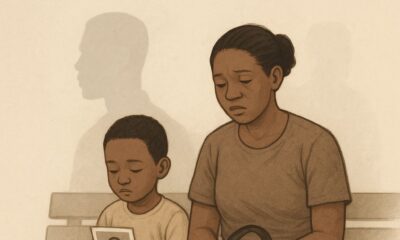Features
Tobi Lufadeju: Dear Young Person…
Since we cannot successfully worry our way through life, we must do something. In Jobs’ words, random acts that he stumbled upon following his intuition and curiosity turned out to be priceless. Our seemingly useless experiences add up, whether we realise it or not. For example, that summer you spent with your uncle that sells electronics at computer village, or your NYSC job where you were a personal assistant to a product manager that supervised five software engineers. The more experiences and identity capital you have, the better. The dots from Jobs’ story are basically pieces of identity capital that he acquired during his crisis and connected later in life. To connects dots in the future, you need to make dots now – whether randomly or purposely. Weaving together the important parts from different phases of your life can then make for a good story in the end.
 In the film Slumdog Millionaire, we watched Jamal, a poor 18-year-old orphan, who was one question away from winning 20 million Rupees (USD 430,000) on the popular game show, Who Wants To Be A Millionaire. Everyone was shocked at this performance. Jamal was first accused of cheating, then arrested. They wondered how an illiterate kid from the slums of Mumbai could know so much. Was he a fraud or a genius? To exonerate himself, he had to explain to the police why he knew what he knew. It turned out that Jamal’s good fortune was not linked to any fraudulent act or unusual brilliance on his part. Jamal recounts his life story through flashbacks, and we see how his seemingly random personal experiences growing up provided him with the right answers. The police eventually let him back on the show. He answered the last question correctly and won the cash prize. What a coincidence! Or not.
In the film Slumdog Millionaire, we watched Jamal, a poor 18-year-old orphan, who was one question away from winning 20 million Rupees (USD 430,000) on the popular game show, Who Wants To Be A Millionaire. Everyone was shocked at this performance. Jamal was first accused of cheating, then arrested. They wondered how an illiterate kid from the slums of Mumbai could know so much. Was he a fraud or a genius? To exonerate himself, he had to explain to the police why he knew what he knew. It turned out that Jamal’s good fortune was not linked to any fraudulent act or unusual brilliance on his part. Jamal recounts his life story through flashbacks, and we see how his seemingly random personal experiences growing up provided him with the right answers. The police eventually let him back on the show. He answered the last question correctly and won the cash prize. What a coincidence! Or not.
I wonder if my life experiences are worth almost half a million dollars. Are yours? More importantly, how do I make them so?
Identity Crisis
The twenties are an important time for figuring out life. How we use that time can make a huge impact on the turn our thirties and forties will take. Most of us face some form of identity crisis; not sure of who exactly we are and what we should be doing. Social media, especially, mounts enormous pressure on us to do more and be more. Seeing your mates tweet “I got the job”, “today is my first day at Apple” or “OMG just got accepted into Harvard” can leave you feeling like everyone, except you, is making moves. One pressing question that many people, regardless of age, ask is, “What am I doing with my life?” Some have come up with frameworks and quick fixes to answer this question. The most notable of them might be the Venn diagram visualising the westernised version of the Japanese Ikigai concept.
While it is relatively easy to point out areas of interest, the moment words like purpose, passion, fulfillment, and true calling get thrown into the mix, things become overwhelming rather quickly.
Identity Capital – The Solution
One of my favourite books is The Defining Decade by Meg Jay. I see it as a guide for young people trying to navigate different parts of life – self-identity, career, relationships, etc. It is not a faux pas attempt at motivation (AKA aspire to perspire). It is a guide on how to think and weigh options at that stage in life. Being a psychologist, Jay’s many years of experience come in handy as she presents real scenarios with clients going through the aforementioned motions. She gives some advice on how to move out of an identity crisis – by acquiring identity capital.
“Identity capital is our collection of personal assets. A repertoire of individual resources that we assemble over time.” It includes our skills, hobbies, degrees, societies, experiences, and networks that make us who we are. Even things like our physical appearance and details from our upbringing – as we saw in Jamal’s case – can be identity capital. We spend this capital to get interviews, jobs, connections, and even have interesting conversations with strangers on a night out. Jay explained that while in the rut of an identity crisis, we must be purposeful about building identity capital. A bit of crisis and a bit of capital make the best stories.
Gaining identity capital is not an end in itself. Rather, it is a means to an end. The idea is to expose yourself to various adventures and challenges and build meaningful experiences that open up greater opportunities in the future. Enough of random, uncoordinated actions. You need to be proactive and selective with your experiences. You might not know exactly what you are preparing for, but you must keep making conscious efforts that count towards something. Some pieces of identity capital might be easy to link while others are not. Either way, keep acquiring.
In his 2004 Stanford commencement speech, Steve Jobs shared a personal story that he titled Connecting The Dots. Jobs dropped out of college after only six months but stayed on campus for another 18 months. He stopped taking required classes that didn’t interest him and started sitting in on those that did. He liked seeing the beautiful posters around campus, and even though he couldn’t see any practical application of the knowledge, he joined a calligraphy class. When designing the first Macintosh computer ten years later, that seemingly meaningless part of his life came in handy. Having learned about comic sans and the likes, he was able to apply that knowledge to build the first computer with beautiful typography, and today we have beautiful fonts on our personal computers.
The Crux
There is a common theme in Meg’s book and Jobs’ story – being confused is okay, but being idle is not. Since we cannot successfully worry our way through life, we must do something. In Jobs’ words, random acts that he stumbled upon following his intuition and curiosity turned out to be priceless. Our seemingly useless experiences add up, whether we realise it or not. For example, that summer you spent with your uncle that sells electronics at computer village, or your NYSC job where you were a personal assistant to a product manager that supervised five software engineers. The more experiences and identity capital you have, the better. The dots from Jobs’ story are basically pieces of identity capital that he acquired during his crisis and connected later in life. To connects dots in the future, you need to make dots now – whether randomly or purposely. Weaving together the important parts from different phases of your life can then make for a good story in the end. While Jobs’ experience might have been a total coincidence, you still want to have something in your hands for when the occasion arises. After all, life can be a series of coincidences. As Jobs said, “You can’t connect the dots looking forward, you can only connect them looking backward.”
All Experiences Are Equal, But Some Are More Equal Than Others
Even after getting an opportunity, you must continue to acquire more identity capital for your next dream opportunity. It is important to be strategic when taking jobs and filling employment gaps, especially if you have options. Ask yourself, “how will this work experience take me to the next destination?” One crucial fact to note is that not all job experiences are worthwhile. Companies are only focused on what they want to get from you, but it should be a two-way transaction. What’s in it for you? One should take jobs with plenty of career capital, where you’ll gain remarkable experiences, build high-quality relationships, and learn the most. This might not necessarily be the highest paying job, but the summation of additional skills acquired can set you up for something much bigger. Weighing job offers with the intent of gaining the most identity capital will lead you to make decisions differently. For instance, one might purposely seek job opportunities with frequent travel over remote gigs, or choose to work with a larger cross-functional team rather than a smaller homogeneous group. If you happen to take a job and realise you’re not learning or gaining any career capital, you should probably leave – if you can.
Spending too much time in confusion can be dangerous. We risk becoming irrelevant if we allow ourselves to be carefree without gaining anything for too long. Amid all the uncertainty, it is necessary to engage in something tangible. Satisfy your curiosity. Do as much as you can. That is the idea of the renaissance that produced the likes of Da Vinci. By actively pursuing one interest, you gain knowledge that can help to further another interest. Da Vinci, for instance, loved to study human anatomy. His in-depth knowledge in this area helped him to produce many magnificent artworks on the human body, like the Vitruvian man.
Volunteer, learn a new language, try out a sport, intern at your cousin’s office, start a business, write a blog, start a podcast or YouTube channel. Long and short, do something. Don’t be shy to share your new skills or experiences with the world. Put yourself out there so that people can find you when they need you or share with you information that you can benefit from. Otherwise, opportunities will keep passing you by.
I can’t say for a fact that by acquiring identity capital and connecting the dots, you will win half a million dollars on a game show or start the world’s most valuable company, but you just might. Either way, be prepared and trust that the dots will somehow connect in your future.





















